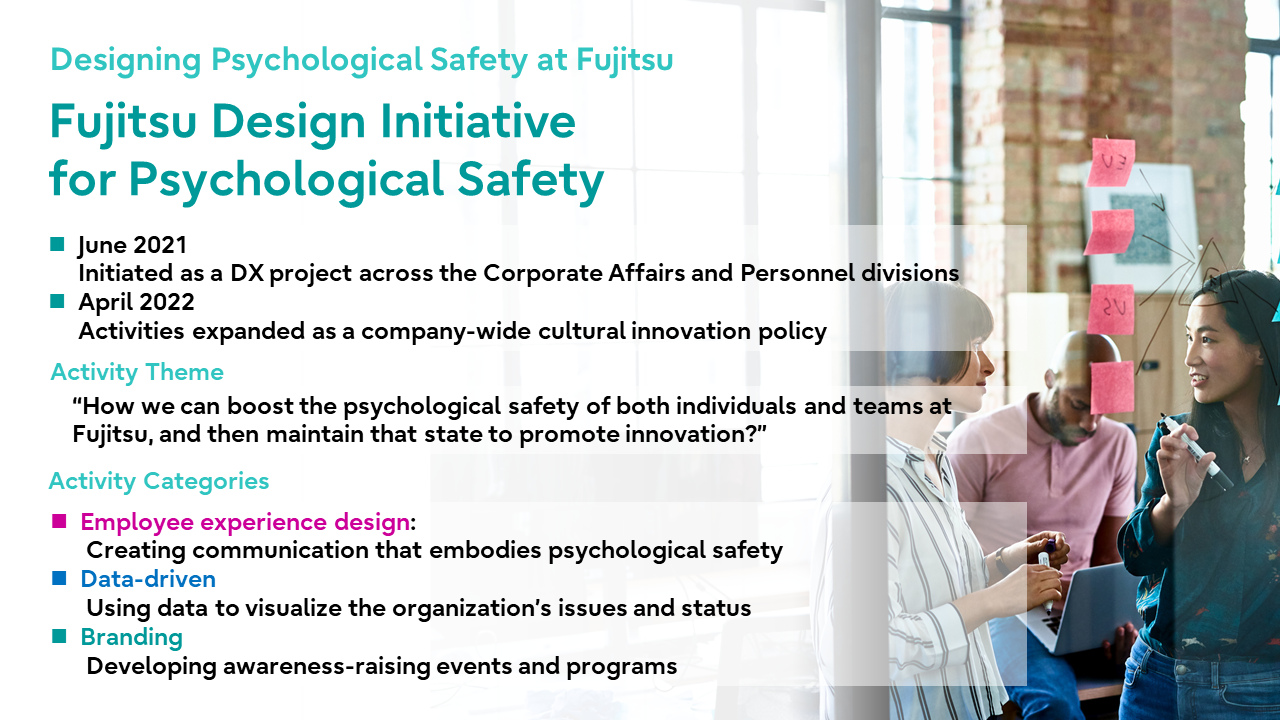Social Well-being
Work Environment
Promoting New Ways of Working with ‘Work Life Shift’ Under the New Normal
In these uncertain times, Fujitsu is promoting Work Life Shift as the New Normal to generate higher employee productivity than ever before, while ensuring that creativity and innovation continue to grow. Work Life Shift is a concept that achieves employee Well-being by not only focusing on ‘work’, but by completely shifting the ‘job’ and the ‘lifestyle’. We are implementing various initiatives, both in terms of personnel systems and workplace environment changes, that will allow us to create and deliver value for our customers regardless of location or time and that will enable the ongoing transformation of Fujitsu itself. The Work Life Shift offering consists of three key categories: Smart Working, Borderless Office, and Culture Change.
Smart Working
Employees of Fujitsu Group companies in Japan work principally on a teleworking basis (excluding those in manufacturing facilities and those assigned to customer sites). Our employees enjoy an optimal work style that allows them to choose flexible working hours and a work location that suit the characteristics and objectives of their work tasks as well as their lifestyle.
Borderless Office
Freed from the constraints of working in a traditional fixed workplace, employees can select a location that ideally matches the required task – be it their home, a hub office, a satellite office, or other appropriate workspace.
Culture Change
People management founded on high levels of employee autonomy and trust will generate maximized team performance and enhanced productivity.
Announcing Work Life Shift 2.0 -- DX Company Work Styles that Cater to Everyone’s Well-being
In October 2021, Fujitsu announced Work Life Shift 2.0 as a way to achieve a true hybrid work style that includes the effective use of real communication in the office and also aims to provide workers a more fulfilled life. The new version puts in place more advanced measures that reflect both employee feedback and issues that arose when the original Work Life Shift was implemented.
-
Practical Hybrid Work and the Evolution to “Experience Place”
As we look towards a post-COVID future, the office is evolving from the workplace of the past to an “experience place” that offers experiences only available at the office. New ways of using the office provide greater collaboration through real communication as we transition to a true hybrid work style that combines the real with the virtual. -
Evolution of Work Styles for a DX Corporation
At Fujitsu, we are making the value of the various experiences gained from putting hybrid work into practice visible as data as we move towards a work style that boosts productivity while allowing for greater creativity. We are also further stepping up our collaborations with other corporations and local governments who support the Work Life Shift concept and contributing to the resolution of problems for our customers and the community more broadly. -
Enabling Work-Life Synergies
By leveraging flexible work styles to make workers’ home lives more fulfilling, we are generating synergies and promoting new value creation, as well as achieving greater engagement and improving the well-being of all our employees.
Fujitsu Telework System
In April 2017, Fujitsu formally introduced a telework system that allows for flexible ways of working that are not tied to a specific location. This system is available to all Fujitsu parent company employees in Japan and includes working from home or a satellite office as well as working during business trips.
The telework system facilitates business continuity in emergency situations such as the spread of infectious diseases and during natural disasters, providing for work innovations such as holding online meetings and digitizing written materials. It also provides an environment that makes it easier for employees with other commitments, such as raising children or caring for relatives, to continue working, helping Fujitsu to support and retain valuable personnel.
-
Goals of the System
- To boost individual productivity and maximize the benefits of team work
- To build an environment that supports continued participation by a diverse range of staff
- To ensure business continuity and rapid responses to disasters
Initiatives Aimed at Reducing Long Working Hours
The Fujitsu Group aims to improve the well-being and productivity of every employee through a variety of initiatives aimed at reducing long working hours. By promoting Work Life Shift, we aim to implement practical hybrid work modes that combine real and virtual work to suit job goals, thereby improving productivity and creativity in work styles that create new value.
-
Examples of specific initiatives aimed at reducing long working hours:
- Creating mechanisms to balance the workload across each day (canceling core time in flex time systems and utilizing breaks and restarts)
- Promoting refresher periods (setting a recommended number of annual leave days to suit the summer and New Year breaks)
- Using push notifications relating to working hours (sending alert e-mails regarding overtime work, displaying pop-up messages in punch in/out systems regarding health and communications for people working long hours)
- Improving management (management education on working hours)
Support for a Healthy Work-Life Balance
Fujitsu and its domestic Group companies aim to generate new forms of value through Work-Life Synergies. We support each employee’s efforts to enrich their career with initiatives in areas such as childcare and nursing care.
1. Childcare
- Childcare leave (available until the day prior to the child’s 1st birthday, but extendable until the first April 20th following the child’s 2nd birthday depending on the availability of day care)
- Paid childbirth support leave (up to 20 days (4 weeks) can be taken by spouses or partners up to 8 weeks before or after the birth of the child)
- Use of annual leave is permitted during childcare leave (up to 20 days (4 weeks) can be taken)
- Paid child illness/injury leave (to provide nursing care, accompany the child for vaccinations or health checks, take part in school events, etc.)
- Childcare reduced working hours system (up to March 31 in Year 6 of elementary school; can reduce by a maximum of 2 hours per day)
- Remote working (support for raising a disabled child, single parents, or families where a spouse is posted overseas)
-
Cafeteria Plan (can be used for childbirth preparation, and to purchase babycare products such as diapers and breast pumps, or children’s supplies)
- Childcare options (babysitting, nursery school and household help expenses) are available for double points under the Cafeteria Plan
- Release of childbirth and childcare guidelines and a handbook for working parents
2. Caregiving
- Caregiving and care preparation leave (up to 1 year in total per family)
- Family care leave (up to 20 days (4 weeks) available)
- Reduced working hours for caregiving (until the issue requiring care is resolved)
- Remote work (family caregiving/nursing)
- Training in basic knowledge for working while caregiving, and deployment of tools that support balancing work and caregiving
- Release of Handbook on Managing the Balance Between Work and Caregiving Responsibilities
- Establishment of a contact point for advice
VOICE Program
The Fujitsu Group launched the VOICE Program in October 2020, as a project to "not only listen indirectly to customers' ‘voices’, but also listen more directly and more often" as well as to "directly link the opinions of all Fujitsu Group employees to management". The concept of VOICE is symbolized by the slogan "change one's voice into a force and create a wind of change". This is an activity that aims to heighten corporate competitiveness by collecting the ‘voices’ of customers and employees and – by using them to speed up decision-making in business activities – thereby change behavior, raise awareness, and generate encounters.
As part of efforts to enhance the workplace environment, we periodically conduct surveys related to Work Life Shift and the results are reflected in a range of measures that leverage the VOICE program, such as business process reforms and the review of systems and operations. This leads to improvements in employee experience and employee engagement.
Measures to Enhance Communication
Labor Relations
Fujitsu has a union shop agreement with the Fujitsu Labor Union. Based on this, we hold discussions on various conditions of employment conditions and explain management policies and business conditions, along with business reorganization and other matters, to employees through regular and ad hoc meetings such as the Labor Council or Productivity Council. These agreements also stipulate the collective bargaining rights of the union.
In Europe, the Fujitsu European Labor Relations Council Annual General Meeting has taken place every year since 2000, with the overall financial conditions of the Fujitsu Group and other issues shared with employee representatives from Fujitsu Group companies.
Fujitsu has established a consultation service as a contact point for queries to the Human Resources and Administration Units. This is part of a structure that is designed to make it easy for employees to seek guidance on human resource and administrative programs.
In-house Social Media Network
The Fujitsu Group uses an in-house social media network to strengthen the ties between people all around the world, enabling diverse and talented employees to engage in communication that goes beyond the organization. As communities become more diverse, this network offers spontaneous forms of communication for employees that extends beyond mere interchanges within the organization, encouraging new business plans, secondary jobs and workations, and allowing exchanges of information on careers in the life sphere, such as child-raising and caring.
It is also used by employees to discuss opinions and aspirations circulating in the community, such as staff management policies and the environment.
Initiative to Boost Psychological Safety
Fujitsu Design Initiative for Psychological Safety -- A Project to Design Psychological Safety
In June 2021, the Fujitsu Group initiated a project to design psychological safety into its organizational environment such that the environment will promote mutual trust among its employees as they tackle challenges and experience failures.

1. Promoting the project through design concepts
This project poses the question of how we can boost the psychological safety of both individuals and teams and then maintain that state to promote innovation. It also puts forward the overall project design and the communication solutions as design concepts. Promoting the project through design concepts leverages the diversity of the project members so that problems can be solved creatively from the perspective of employees.
2. Release of the free “Fujitsu Psychological Safety Playbook”
To promote better understanding and behavioral change among employees around psychological safety, we released a “Playbook” within the company to provide basic understanding and improvement models. The Playbook has now been viewed over 14,500 times in all. In May 2024, we updated the content of the Playbook released internally with the aim of providing practical tips for everyone who works in corporate organizations that are engaged in human capital management and cultural innovation.

3. Development and delivery of Psychological Safety Improvement Programs
Psychological Safety Improvement Programs have been developed for each part of the organization and have been delivered to 4,500 people so far. In organizations where these programs have been delivered, psychological safety scores on engagement surveys have improved and substantial changes in behavior are being seen that will lead to greater psychological safety.
4. GOLD RING award received at the Psychological Safety Awards 2024
At the Psychological Safety Awards 2024, sponsored by ZENTech, Fujitsu received the GOLD RING award.

Key Initiatives in Regions Outside Japan
CSR Events in the Philippines, Thailand and Vietnam

As part of their Corporate Social Responsibility (CSR) initiatives, Fujitsu Group companies in Southeast Asia organized a variety of events to promote physical activity. Specifically, they held a joint event with a Special Olympics NGO in the Philippines to support athletes who require special assistance, an RMHC Mini Marathon Run For Kids in Thailand, and provided support for underprivileged children in remote mountainous areas of Vietnam. Additionally, events promoting activities such as soccer, basketball, trekking, and badminton were also held.
Student Visit to Fujitsu Hong Kong Office

On April 11 2025, as part of a joint initiative with Generation Hong Kong, Fujitsu Hong Kong Ltd. welcomed a visit from students of the TWGHs Wong Fut Nam College. Fujitsu employees spoke about their career paths and individual experiences, showcasing the diverse possibilities within technology industry. The interaction between employees and students proved to be a valuable experience for all involved.
FY2024 Performance
Initiatives Aimed at Reducing Long Working Hours
The discretionary working system applies to 19% of employees, and the flex time system applies to 77% of employees (Fujitsu Limited)
Telework Rate
The telework rate is around 70%.
Unionization Rate
The unionization rate is 76.5% (Fujitsu Limited) *Calculation basis includes managers and non-regular employees who are not union members.
Turnover Rate



